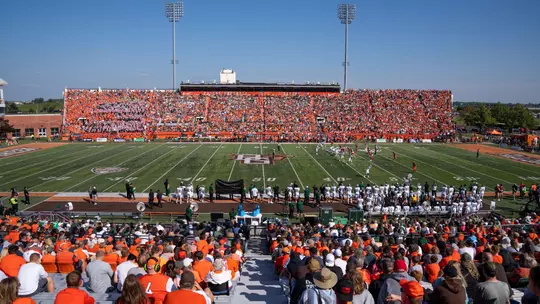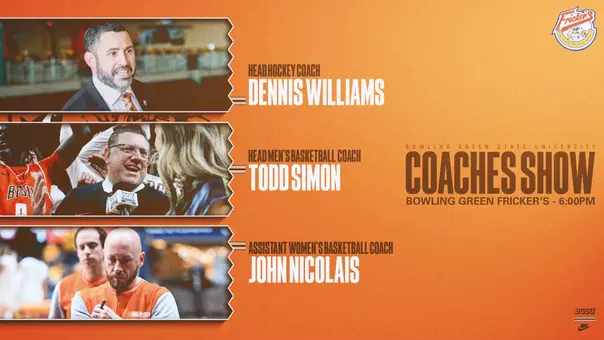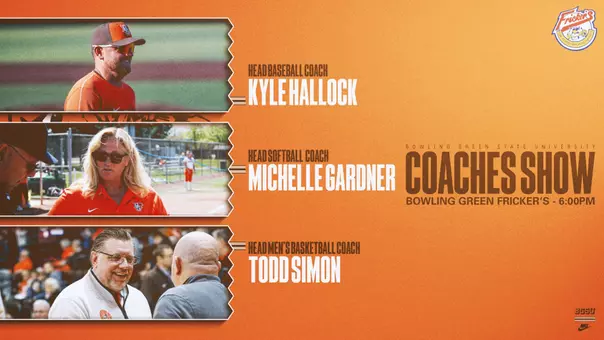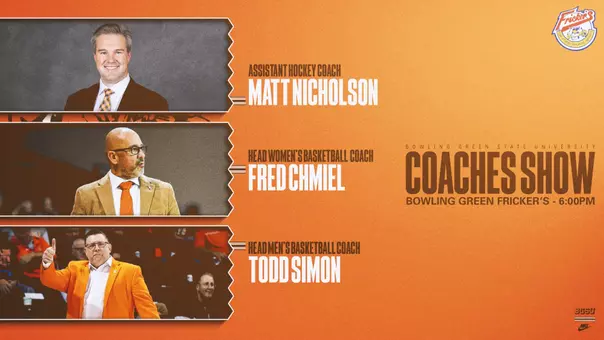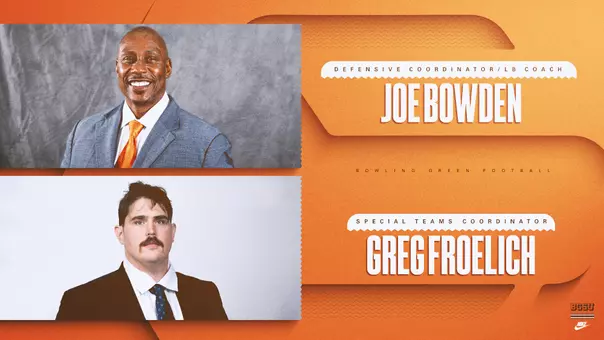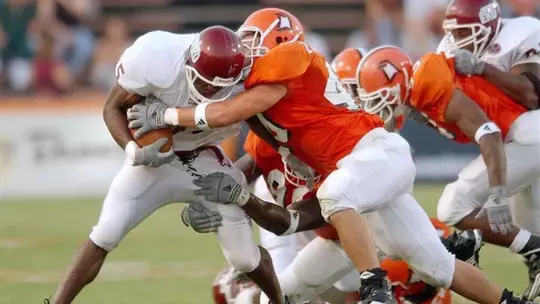
Paying It Forward: Teddy Piepkow’s Lifelong Connection to BGSU
By Patrick Stevens
4/21/2025
Teddy Piepkow is a former Bowling Green football captain who built a successful career in business after graduating from BGSU. He currently serves as the senior sales manager for the Nordson Corporation. Known for his leadership, humility, and strong sense of community, Teddy has remained closely connected to BGSU through alumni boards, athletic support and mentorship. His commitment to giving back reflects the same dedication that made him a standout on and off the field.
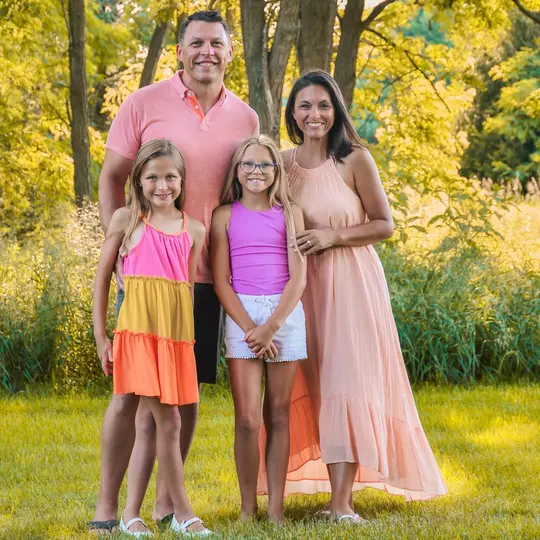
The memory is vivid, even a quarter-century later. It was Teddy Piepkow’s first trip to Bowling Green’s campus, and he came for a one-day camp before his senior year of high school. Plenty was at stake; he didn’t have a scholarship offer yet from then-Falcons coach Urban Meyer.
Taking it all in on that summer day was future Bowling Green Hall of Famer Josh Harris.
“He was hanging out under the tree watching juniors go to camp, and Josh kind of pulled me aside and said, ‘You’re playing hard out there, and you’re standing out,’” Piepkow recalled. “I still remember that, and it was 25 years ago. It was a feeling I had—the feel of the program, the direction of the program, and the buy-in from the players and the staff—that was where I wanted to be.”
The scholarship offer eventually came, and the decision turned out to be one of the most significant of Piepkow’s life.
There was the short-term experience at Bowling Green, where he became a multi-year starter at linebacker. And there was a long-term affiliation with the school that lasts to this day.
It has meant staying involved with the university in several ways, deepening his ties over time with a place he credits for so much of his success.
"It's really important to give back, whatever that looks like for people—whether it’s through your time, your talent, or your financial support,” Piepkow said. “It’s really critical. I think there’s a sense of belonging and ownership that comes with financial stewardship—knowing that what you’re doing is directly impacting students and future generations, helping them go out and make the world a better place.”
A portion of his attachment naturally came from his efforts with the football program. A naturally fast learner, he looked to emulate players already in the Falcons’ program when he arrived.
He wanted to work his way into the same spot as Chris Haneline, the team’s leading tackler in 2002. He learned from training alongside Mitch Hewitt, a captain on the 2003 team that won the Motor City Bowl and finished 23rd in the final AP poll—a friendship Piepkow maintains to this day.
And there was much to absorb from Jovon Burkes, a two-year captain whose injury on the first day of preseason practice in pads opened the door for Piepkow to see significant playing time as a sophomore in 2003.
“Jovon was such a fan of mine, and it was never a situation where ‘Teddy’s taking my spot,’” Piepkow said. “It was, ‘I can’t play right now, I care about this team, and how can I coach this young guy up to get to the level that’s the standard of Bowling Green football?’ As soon as Jovon came back, we developed an awesome friendship that’s still maintained today. He was my biggest cheerleader outside of my mom and dad.”
Piepkow would become a captain himself as a senior in 2005 and remains an influential figure in a strong stretch of Bowling Green football history. But it was hardly the only part of his college experience that strengthened his bond with the school.
He refereed intramural basketball games—a side gig he doubts many college football players took on then (and probably don’t now, either). But it allowed him to meet plenty of people on campus. He chose to enter the College of Business to ensure he would be marketable, then made it a point to take advantage of the school’s career center and attend job fairs.
It's really important to give back, whatever that looks like for people—whether it’s through your time, your talent, or your financial support.Teddy Piepkow
At every turn, there were opportunities to connect with the community. Piepkow embraced as many as he could.
“That experience has really led to me feeling fulfilled as an adult and as a father,” Piepkow said. “Looking back, those four and a half years on campus were a foundational experience. I belonged there. I had an opportunity to stand out, take advantage of what was in front of me, and really go far since leaving campus.”
An appreciation for a quality experience is only part of what has kept Piepkow engaged with Bowling Green. He also wanted to stay tethered to the university in some form.
That’s more unusual than many might assume, according to Dan Meyer, the school’s senior associate athletic director for resource development.
“When student-athletes graduate from BGSU, their last email address has an @bgsu.edu, and then they go to their job and get a different personal email. They change their cell phone number, and their work phone becomes their primary number,” Meyer said. “If we don’t stay connected early on, it’s amazing how quickly an alumnus drifts away in terms of communication.”
That wasn’t a problem with Piepkow. He served on the Young Alumni Board for both the university and the College of Business in the years shortly after he graduated. His ties have been further strengthened by his time on the Athletics Leadership Council.
That early engagement opened his eyes to the business side of the school and helped him realize how many people it takes to ensure the future success of students coming into college now.
“For some reason, there’s an alarmingly low percentage of athletes who give back to their university,” Piepkow said. “It’s really troubling for me to understand that because when I was there, my out-of-state tuition and grant-in-aid were funded by alumni and the community who were already giving back. I’ve always felt a sense of obligation to pay it forward to the next generation. I think it’s really important to understand how we all got there.”
Piepkow has maintained his connection to Bowling Green beyond his board work. He visits Doyt Perry Stadium during the fall and makes the roughly two-hour trip from his home in Michigan for other on-campus events.
Over the years, that’s included recruiting Bowling Green students for the companies he’s worked for. Currently, he is the senior sales manager for the Nordson Corporation, a role that gives him responsibilities across North America.
His success has allowed him to give back in more ways than just his time. As he has progressed in his professional life, his financial contributions to Bowling Green have also increased.
“As he’s grown in his business career—now that he’s in his 40s, as much as he might be sad to say he’s in his 40s—he’s had the success you would expect of a guy of his character,” Meyer said. “Now he has the means to give back to BGSU, and that number has escalated over the last couple of years. He has enough disposable income to pursue his philanthropic passion of supporting BGSU and helping us become the best version of an athletics program we can be.”
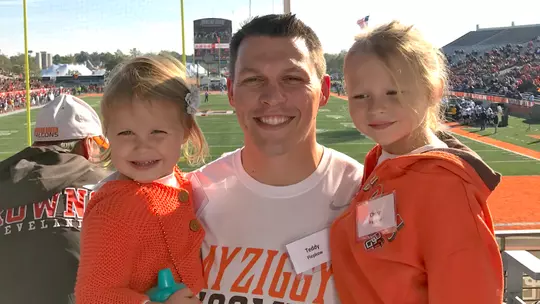
I would encourage alums, particularly athletic alumni, to get back on campus and see what’s going on. Go back for a soccer game, go back for a football game—see what’s happening.Teddy Piepkow
Piepkow looks back with immense fondness on his college career, both on and off the field. One of the lasting lessons from his experience was recognizing that college is about more than just attending class, practices, and games.
That involvement fuels his curiosity about what’s next for the school and drives his optimism that other Falcons who have graduated will reconnect as well.
“I would encourage alums, particularly athletic alumni, to get back on campus and see what’s going on,” Piepkow said. “Go back for a soccer game, go back for a football game—see what’s happening. President [Rodney K.] Rogers and [athletic director] Derek [van der Merwe] have talked about momentum, and I think we really have it. It’s tough to see through an email blast or a newsletter, so come back to campus, reach out to the athletic administration team, and see what that momentum is all about—see how you can be a part of it.”
Meyer considers Piepkow a “model graduate” and admires how he has sought to stay connected with the school as much as it has tried to stay connected with him. He hopes Piepkow’s example will inspire former athletes in other sports to re-engage with the university—and encourage their former teammates to do the same.
Piepkow is the person Meyer often calls first when he needs to reach a football player from Piepkow’s era. But there’s also the future to consider, and Piepkow’s passion for Bowling Green could influence future Falcons as well.
Take, for example, a recent family trip to an ice hockey game and the conversation he had with his 10-year-old daughter on the way home.
“She thinks she’s going to be a college soccer player one day, and I hope if she works hard enough, she’ll have that opportunity,” Piepkow said. “She said, ‘Daddy, I want to go to Bowling Green.’ I got emotional about it.
“I have a colleague at work I’ve known for 15 years, and his son recently committed to Bowling Green—not for athletics, just for school. And I got emotional about that, too, because I care about this place so much. Just to be able to create new experiences for people who weren’t necessarily part of the Bowling Green family before—knowing they’re going to have a transformational experience—that means everything to me.”
About the Author: Patrick Stevens is a veteran sportswriter who has covered college athletics across D.C., Maryland, and Virginia for nearly two decades. His work regularly appears in The Washington Post, Blue Ribbon College Basketball Yearbook, and The Athletic. Known for his deep knowledge and storytelling, Stevens brings thoughtful perspective to the athletes, coaches, and programs he covers.
